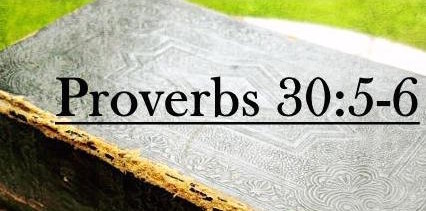The book of Proverbs is filled with wisdom and warnings. I generally read a proverb every morning and usually find a verse or two to meditate on throughout the day. I recently read Proverbs chapter 30 and was challenged by verses five and six: “Every word of God is tested; He is a shield to those who take refuge in Him. Do not add to His words or He will reprove you, and you will be proved a liar.” There is a clear warning found in these verses to not add to the words of God. The Hebrew is as clear as the English: “אל תוסף על דבריו” – “al tosef al devarav” – “Do not add to His words!”
How Does One Add to God’s Words?
An obvious transgression of this warning is for those who take God’s words, the Holy Scriptures, and add to them whatever they want for their own theological satisfaction. Two examples of this would be both Mormonism and Islam. Both of these religions add literal books, the book of Mormon and the Quran respectively, over and above the authority of the Bible for the sake of justifying a different path to God.
Is there more to this warning than these obvious examples? Are we ever in danger of adding to God’s words? These are valid questions for us to consider. As we consider these questions I would like to look at a vivid illustration of “adding to God’s words” in this week’s Torah Portion.
This video provides a brief summary of this week’s commentary
Balak
This week’s Torah Portion is called “Balak” and it is named after the king of Moab who sought to curse and destroy the Israelites. It is a unique Torah Portion in many ways beginning with the very name of the Torah Portion.
How many Torah Portion titles are named after people? There are 54 individual Torah Portions. Of these 54 sections of the Torah, only six of them are named after people. Of these six titles, only two of them are named after Gentiles; Yitro and Balak. Yitro is Jethro, Moses’s father-in-law, who only sought to bless the Israelites (Ex. 18). Balak, is the only Gentile referred to by name among the list of Torah Portions who sought to do harm and destroy the Jewish people. This entire Torah Portion focuses on Balak’s zeal to curse and destroy the Jews.
In this week’s Torah Portion we find the Israelites camping in the plains of Moab next to the Jordan River, opposite the city of Jericho (Num. 22:1). The Israelites had just fought and won two battles, one against the Amorites and the other against the people of Bashan (Num. 21:21-35). The Moabites heard of these two defeats of their neighbors and feared that they were about to be next: “So Moab was in great fear because of the people, for they were numerous; and Moab was in dread of the sons of Israel” (Num. 22:3). Balak the King of Moab decided to be proactive and called the elders of Midian together with his own elders and devised a plan to defeat the people of Israel (Num. 21:4-6).
King Balak’s plan was not a military strategy or a request from foreign kings to form an alliance against Israel; instead, his plan was to call a certain “prophet,” Balaam, to come and curse Israel:
Behold, a people came out of Egypt; behold, they cover the surface of the land, and they are living opposite me. Now, therefore, please come, curse this people for me since they are too mighty for me; perhaps I may be able to defeat them and drive them out of the land. For I know that he whom you bless is blessed, and he whom you curse is cursed. – Num. 22:5-6
This is the message that Balak sent with his delegation to call Balaam to come and curse Israel. Balaam’s name in Hebrew is “בלעם” – “Bilam” and most likely originates from the Hebrew “בליעם” – “Bliam” which means “without a people” or “without a nation.” The irony of this story is that King Balak was trying to curse the Israelites who are the “people of God” by a man whose name means “without a people.”
The Reason for Choosing Balaam
Balak sent for Balaam to curse the Israelites. Did Balak not have a magician in his own kingdom to curse them? Why did Balak send for Balaam who was located in the area of Mesopotamia hundreds of miles away?
Balak must have believed that Balaam had supernatural powers as he stated in his call to Balaam; “For I know that he whom you bless is blessed, and he whom you curse is cursed.” All of us have the ability to bless and curse with our words everyday, however, Balak declared that Balaam’s blessing and cursing were powerful and effective. Balak elevated Balaam’s status to the place of God. God alone is the ultimate source of blessing and cursing. God blessed Adam and Eve after he had created them (Gen. 1:28) and God cursed the serpent, the labor pains of the woman, and the labor of man because of deception and sin (Gen. 3:14-17). Balak assigned to Balaam the power of God. Balak would soon learn that Balaam was just a man who could neither bless nor curse without God’s permission.
(for additional information regarding the biography of Balaam, click here: Biography of Balaam)
Balak’s delegation of leaders took the money of divination to pay Balaam and traveled to his city of Pethor, which is located in Aram on the Euphrates River. When they arrived they told Balaam all of the words of Balak, the king of Moab. Balaam invited them to stay the night and told them that he would find out what the LORD would speak to him (Num. 22:7-8).
God came to Balaam that very night and asked him, “Who are these men with you?” (Num. 22:9) Balaam explained to God the whole story about King Balak and how there is this vast people who came out of Egypt whom Balak has requested that he curse. God’s response was short, sweet, and to the point: “God said to Balaam, ‘Do not go with them; you shall not curse the people, for they are blessed’” (Num. 22:12). Balaam obeyed God’s word and the next morning he told the delegation which was sent to him that God has refused to let him go with them. So the delegation left, returned to Moab, and informed Balak of Balaam’s reply.
The Second Call
Balak would not accept Balaam’s negative response and sent a second delegation:
Then Balak again sent leaders, more numerous and more distinguished than the former. They came to Balaam and said to him, “Thus says Balak the son of Zippor, ‘Let nothing, I beg you, hinder you from coming to me; for I will indeed honor you richly, and I will do whatever you say to me. Please come then, curse this people for me.’” (Num. 22:15-17)
The wording in the beginning of this first sentence is literally in the Hebrew: “ויסף עוד בלק שלח שרים רבים” – “veyosef od Balak sheloach sarim rabbim” or “And Balak added more sending numerous (great) leaders.” We see the Hebrew word “yosef” here which can mean “again” or “to add.” Balak was adding to his original delegation and his original offer by sending more distinguished leaders of the people and promising to grant Balaam whatever he wanted, riches and honor. We’ll see the significance of this word “yosef” – “to add” later in the story.
Balak’s second delegation arrived to Balaam’s home and Balaam responded to Balak’s additional offer with words of great integrity: “Balaam replied to the servants of Balak, ‘Though Balak were to give me his house full of silver and gold, I could not do anything, either small or great, contrary to the command of the LORD my God’” (Num. 22:18). Balaam’s response to Balak’s delegation was resolute and he could have been named in the “faith hall of fame” had it not been for his next words: “Now please, you also stay here tonight, and I will find out what else the LORD will speak to me” (Num. 22:19).
Balaam Sought to Add to God’s Word
God had already spoken to Balaam and told him “Do not go with them; you shall not curse the people, for they are blessed” (Num. 22:12). Balaam knew God’s word and His will in this matter without a shadow of a doubt, however, Balaam told the second delegation to spend the night in order for him to find out what else the LORD would speak to him. This phrase in Hebrew is literally “מה יסף יהוה דבר עמי” – “ma yosef Adonai daber immi” or “what else will the LORD add in speaking with me.”
Balaam had already sought God regarding Balak’s offer and God told him NO! When Balaam received the second delegation he spoke as one who truly feared God and would only do what God would say but in essence he was hoping that God would add to the words which He had already spoken to him. Balaam was hoping that God would change His mind and let him curse Israel now so that he could be richly rewarded.
The Hebrew word for “add” which Balaam used in the phrase “what else will the LORD add in speaking with me,” is the exact same word that Balak used in sending the second delegation and also the same word used in Proverbs 30:6; “yosef.” I believe Balaam has clearly illustrated for us the essence of this proverb; “Do not add to His words or He will reprove you, and you will be proved a liar.”
“Do Not Add to His Words”
Balaam didn’t write a book to start a new religion, however, he did seek God in order to receive a new “word from God” that would change the former word which God had already spoken. In reality this is exactly what Islam and Mormonism have both done. They acknowledge both the Old and New Testaments of the Bible but then they add a new “word from God.”
God said No to Balaam but he wanted God to say Yes! So God gave him over to his desire and said, “If the men have come to call you, rise up and go with them; but only the word which I speak to you shall you do” (Num. 22:20).
I recommend that you read this Torah Portion in its entirety to get the full story, however in short, God permitted Balaam to go with this second delegation but only to teach Balaam that his way was contrary to God’s way. God used Balaam’s donkey and the Angel of the LORD to reprove Balaam (Num. 22:21-32). God used Balaam to bless the Israelites and would not allow him to curse them (Num. 23-24), however, Balaam would later be part of a greater plot to bring down the people of Israel (Num. 25:1-9. Rev. 2:14). Balaam was later killed by the Israelites when they attacked the Midianites (Num. 31:8).
There is a subtleness and deception in the way in which Balaam added to the words of God. Balaam appeared to be a submissive prophet who was unable to be bought and vowed only to speak the words which God gave to him. In reality, however, he did not want to obey what God had already clearly spoken to him and wanted God to add to His words. Balaam had a greedy heart and sought riches above God’s word (2 Peter 2:15-16). We also know from the book of Revelation that Balaam taught Balak how to lead the Israelites away from worshiping the LORD through acts involving idols and immorality (Rev. 2:14). Balaam appeared to have obeyed the word of God but in reality he disobeyed by rejecting God’s words to him and adding to God’s word.
“Do not add to His words or He will reprove you, and you will be proved a liar.”
Appropriating the Truth of this Proverb
I would like to present three simple guidelines for appropriating the truth of this proverb in our lives:
-
Obey the written Word of God
-
Obey the personal revelation and guidance that God gives you through His Word and by His Holy Spirit, which will be in conformity to His Word.
-
Don’t seek to add to the Word of God which you have received from Him.
We need to strive to walk in obedience to God’s Word daily and not twist it for our own advantage. God’s Word is clear, directing us in His holy ways. We also need to individually accept and receive God’s leading and direction in our life through His Word and by His Spirit. God may lead one person to fast and pray for a certain amount of time. God may speak to someone else about starting a new church or helping with the poor. We must walk in obedience to God’s written Word and to the leading of His Holy Spirit and be careful not to disobey what He communicates to us.
What is God Speaking to You?
Two Stories
I would like to close with two stories, one personal and one from the Bible. Story #1: When I was studying in university I was involved with a youth group as one of the youth leaders. With the fall semester approaching I needed to choose which classes to take, including the days and times. For whatever reason I felt like I needed a break from being a youth leader and I decided to choose a mathematics class on the same evening when the youth group met. I wanted to tell the other leaders that I just couldn’t be involved that semester because of the class that I needed to take when in reality I could have chosen a different day and time for the same subject. This whole time I knew that God was telling me to continue as a youth leader but I was fighting against Him.
The evening of the first class approached and I had a check in my spirit that I should not be going to this class but rather to the youth meeting. As I approached the university buildings in the evening the whole campus was dark. I went into the building only to find that the electric in the whole building was out and they couldn’t figure out why. Class was cancelled and I realized that God was speaking loudly to me and reminding me that He had other work for me as a youth leader. I went to the youth meeting that night. I learned a valuable lesson that year in obeying the voice and leading of God in my life.
Story #2: The second story is from the book of Kings. There was a certain man of God from Judah who was sent by God to Bethel to prophesy to King Jeroboam. This man of God came to Bethel and spoke the words which God commanded him to speak and all of the words of this man came true (1 Kings 13:1-6). This man was clearly anointed by God and God’s Spirit was upon him. King Jeroboam invited this man to come home with him so that he could reward him but the man of God told Jeroboam that he was not able and he then explained why:
“If you were to give me half your house I would not go with you, nor would I eat bread or drink water in this place. For so it was commanded me by the word of the Lord, saying, ‘You shall eat no bread, nor drink water, nor return by the way which you came.’” So he went another way and did not return by the way which he came to Bethel. 1 Kings 13:8-10
God’s word to this man was very specific and clear; no bread and no water in that place (Bethel) and don’t return the same way you came. The man of God did not want to compromise the word of God for the sake of being rewarded by the king.
As the man of God journeyed back to Judah in obedience to God’s word an older prophet who was living in Bethel heard about this man of God and went after him to invite him to come to his house. The older prophet found him along the road and invited him to his home but the man of God explained to him that he could not eat bread or drink water in that place. The older prophet then told him that an angel of God came to him and instructed him by the word of the LORD to bring this man of God back with him to eat bread and drink water in his home. The man of God believed him and went back with the older prophet to his home, but it was a lie (1 Kings 13:11-19).
The end of this story is tragic. They returned together to the home of the older prophet and both ate bread and drank water. While they were sitting at the table the older prophet received a word from God informing the man of God that because he had disobeyed the word of God he would not be buried in the grave of his fathers. The man of God saddled his donkey and left after he had finished eating and drinking. The man of God was killed by a lion along the road on his journey back to Judah (1 Kings 13:20-25).
God instructed the man of God in a very specific way but the man of God listened to the voice of man rather than God. The man of God believed a lie. The lie was words that were added to the words of God.
“Do not add to His words or He will reprove you, and you will be proved a liar.”
We have God’s Word and we have His Holy Spirit who continues to guide and direct us. What has God already spoken to you? What is God speaking to you today? Let us not add to His words lest He reprove us and we be proved liars. Let us heed His words and take refuge in Him!
Shabbat Shalom!
If you enjoyed reading this article, we invite you to sign up for our weekly Torah Portion commentary on the sidebar to the right.
Torah Portion: Num. 22:2 – Num. 25:9
Hafatara: Micah 5:7 – Micah 6:8
Return to Torah Portion Homepage
Copyright Jewels of Judaism. All rights reserved 2015







Thank you for this beautiful word on the 4th of July shabbat shalom
Dear Rabbi Goldstein,
thank you very much for this serious, deep and very special teaching on this weeks Thora portion! I will keep it in my heart and meditate on it!
It is VERY serious, also as far as Christian church teachings are concerned!
I am so thankful, that G`D brought me back to the roots of faith, the roots HE planted!
SHABBAT SHALOM,
Olive Weitzel